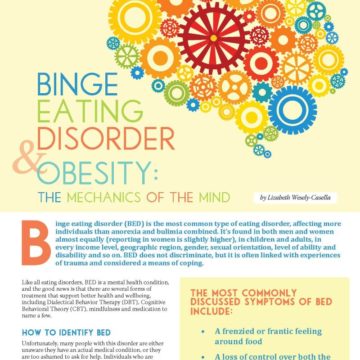A New Option for the Obesity Treatment Gap


by Aurora D. Pryor, MD
Summer 2015
Is your appetite your enemy? No matter how hard you try to diet or exercise, does your hunger cause you to eat too much and defeat your efforts to lose weight?
There is a new treatment you may want to ask your physician to consider for you. vBLOC® therapy is a new, FDA-approved treatment that acts as a “pacemaker” on your appetite.
vBLOC® blocks the signals sent from the nerves in your stomach to your brain telling you to eat more – and you end up eating less. Losing even a small amount of your excess weight can reduce the risks of obesity, such as diabetes and hypertension. vBLOC® therapy can help you lose 25 to 30 percent or more of your excess weight in the first year, and vBLOC® may help you to keep that weight off throughout the following years.
The result for most patients means reduced or even no medications, more energy and a happier, healthier lifestyle.
A New Treatment for Obesity
The newest approach to treating obesity being offered to patients and the medical community is called “vBLOC® Neurometabolic Therapy,” or just “vBLOC®.” vBLOC® therapy is delivered through an implantable device, called the Maestro System, and was approved by the U.S. Food and Drug Administration in January. It is the first new medical device approved to treat obesity in more than a decade.
vBLOC® takes a totally new approach to attacking weight-loss. Many patients using vBLOC® report less hunger, helping them make healthier choices for both diet and exercise. This very simple sounding approach to weight-loss works without changing your lifestyle or even your food choices. It is a tool that helps you control your appetite and lets you eat less of the everyday foods you enjoy.
How vBLOC® Works
Following 150,000 years of evolution, your body developed specific actions to protect you from times of famine, and those actions make the body treat dieting and fat-loss as a threat. These various systems trigger multiple signals, including intense hunger, which act as the body’s defense tool and may cause you to gain (and regain, the yo-yo dieting effect) extra weight.
vBLOC® acts as a long-term partner to help you break the weight-loss/weight regain cycle. It is an active treatment that works throughout the day to help patients eat less and feel fuller longer after eating smaller meals.
Effect of vBLOC® on Body Weight
- People who used vBLOC® lost more excess weight than those with an inactive device who participated in the same post-surgery diet and exercise program.
- On average, people who received vBLOC® for 12 hours per day lost 28 percent of their excess weight in one year.
- In one study, patients on vBLOC® therapy lost weight and saw improvements in their type 2 diabetes and hypertension measures.
This is a therapy that works by partially blocking the signals between your stomach and brain that signal hunger. Those nerves, called the vagus nerves, control the feeling of hunger. By occasionally blocking those signals, the body does not try to “fix” the blockage, leading to weight-loss.
Because vBLOC® directly targets the source of your hunger, to lose weight you do not need to change the foods you eat. You lose weight simply by eating less.
How the Maestro System is Placed
The Maestro System is inserted by your surgeon using a minimally invasive surgical technique called “laparoscopy.” For most patients, this procedure takes about an hour and is performed on an “outpatient basis” as a same-day surgery. The device appears safe, with less than 4 percent of the patients in the study reported to the FDA having device-related complications – the most common of which were nausea and heartburn.
During this procedure, the surgeon will connect the two wires around your vagus nerve, in the area just above your stomach, and place the Maestro device just under the skin below your rib cage. You would not be awake during the procedure, and almost all patients will go home that afternoon.
What to Expect after Your Procedure
Typically, vBLOC® patients are able to go back to work within a few days.
Your physician’s support team will work with you by:
- Scheduling follow-up office visits, especially in the first year of therapy;
- Educating you on how to use and maintain your Maestro System; and
- Helping you manage your diet and exercise program.
For most patients, you will receive vBLOC® therapy at least 12 hours each day, typically during waking hours. The therapy is adjustable and customizable to your personal needs, for both the intensity of the treatment and the hours of use.
Ask your physician if you are a candidate for vBLOC® if you meet these criteria:
1. BMI of 35 to 39.9 with a health-related condition such as:
- Type 2 Diabetes
- Sleep Apnea
- High Blood Pressure
- High Cholesterol
2. BMI of 40 to 45
3. Have been unable to maintain weight-loss through diet and exercise in a supervised program within the last five years.
4. Are at least 18 years of age
Who is not a candidate vBLOC®?
vBLOC® is not for patients with:
- Cirrhosis of the liver (disease of the liver)
- Portal Hypertension (high blood pressure in the veins of liver)
- Esophageal Varices (enlarged veins at bottom of esophagus)
- Significant Hiatal Hernia
- Have another permanently implanted, electrically powered device (e.g., heart pacemaker, implanted defibrillator or neurostimulator)
- Planned MRI or diathermy
- Patients at high-risk for surgical complications
Also, the safety and effectiveness of the Maestro System has not been established for use during pregnancy. If you become pregnant, your surgeon or nurse may choose to turn off your neuroregulator. In all cases, ask your doctor if vBLOC® is right for you.
Making the Decision
Obesity is a very difficult disease, and there are many costs associated with obesity, such as diets, supplements, medications and medical costs. Many people affected by obesity want to lose weight, but existing treatments haven’t worked for them.
vBLOC® therapy is a new alternative for people with obesity that have failed to lose weight through other means and want to try a different surgical option. Talk to your doctor about whether vBLOC® is the best option for you.
About the Author:
Aurora D. Pryor, MD, is Professor of Surgery and Vice Chair for Clinical Affairs, Chief of the Bariatric, Foregut and Advanced GI Division and Director for the Bariatric and Metabolic Weight Loss Center at Stony Brook School of Medicine in New York. Dr. Pryor serves on the Executive Council for the American Society for Metabolic and Bariatric Surgery (ASMBS).
by Kendall Griffey, OAC Communications Manager Spring 2024 We have officially kicked off Your Weight Matters Regional…
Read ArticleTelemedicine became a popular tool during the pandemic because it allows healthcare professionals to provide medical care…
View Videoby Kendall Griffey, OAC Staff; and Chrystal Jones, OAC Staff Fall 2022 For over ten years, the…
Read Article










